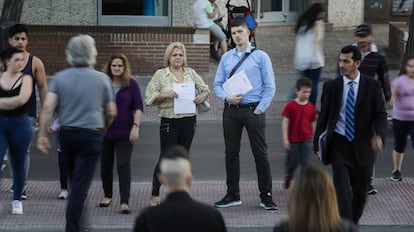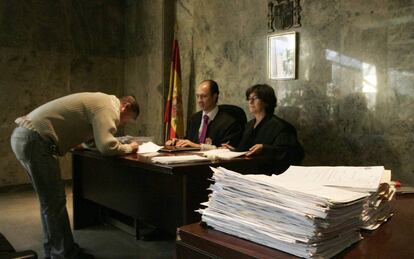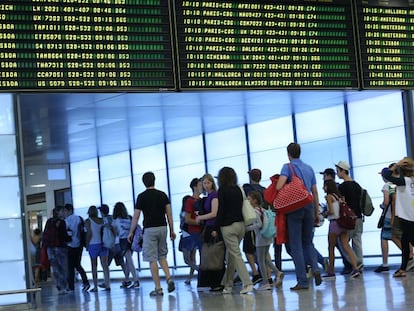Spain blames computer glitch for huge citizenship application backlog
Only 28,077 requests were processed in 2017, leaving more than 400,000 cases still pending


The Spanish administration¡¯s drive to digitalize its services has had an unexpected effect on thousands of immigrants in Spain.
In 2012, the government launched the Intensive Nationality Plan, which can now only be accessed online in order to speed up citizenship application processing times.
In the US it is hard to obtain citizenship, but once you meet the requirements everything goes much faster
Omar Shanaa
Yet in 2017 there were 78% fewer processed requests than in 2016, while applications only declined 19% over the same period.
Sources at the Justice Ministry are blaming a computer glitch for the dramatic decline in processed applications.
¡°The reduction is due to a migration of the computer application, which has taken longer than expected and pushed everything back,¡± said a ministry source.
But applicants are skeptical and concerned.
¡°I¡¯ve been waiting nearly four years,¡± says Rosemary Moraes, a 51-year-old from Brazil who has been living in Madrid for a decade and who applied for Spanish citizenship in December 2014. ¡°I don¡¯t think it should take this long to deal with a case. I feel frustrated.¡±

Her situation illustrates how the current naturalization system is incapable of handling a growing backlog of cases. In 2017, only 28,077 applications were processed, yet by the end of that year there were 409,889 more still pending a decision, according to Justice Ministry data.
Despite the size of this figure, ministry sources said they trusted the situation will be resolved: ¡°In November and December nearly half of all of that year¡¯s applications were processed.¡±
But even if this pace is kept up throughout 2018, it will mean only 84,000 processed cases, the second-lowest figure since records started being kept (2010).
I don¡¯t think it should take this long to deal with a case. I feel frustrated
Rosemary Moraes
¡°We need to rethink the current model because there is a very big backlog,¡± says a spokesperson at the Ombudsman¡¯s Office, whose 2017 situation report reads: ¡°This backlog not only affects applicants but also their families, whose members could lose their legal status despite long residence periods in Spain.¡±
This is a common situation. Nadiya Balaban, a 24-year-old who was born in Ukraine and lives in Borja (Zaragoza), says that she moved to Spain at age nine. ¡°I applied for citizenship in December 2016, took all the necessary exams, and met all the requirements, but I¡¯m still waiting,¡± she says.
Many desperate applicants eventually turn to lawyers and associations for help, but this does little to speed up the process. Iv¨¢n Santos, director of a non-profit migrant support group called Aculco, finds the Justice Ministry¡¯s explanation hard to believe.
¡°It can¡¯t be a computer glitch, that would not explain such a sharp decline,¡± he says. ¡°It¡¯s being said that Europe has asked Spain to slow down naturalization figures, but I don¡¯t know if that is the real reason.¡±
The Aculco representative also notes that these delays mean integration problems and trouble accessing public services like healthcare and education.
Some law specialists also believe that the reason for the backlog is fundamentally political.
¡°It¡¯s a joke to claim that it¡¯s a computer glitch,¡± says Guillermo Morales, director of LegalTeam, a consulting firm specializing in immigration issues. ¡°What¡¯s required here is political will. Most cases are people who work here, who are married and have children.¡±
Emmanuel Aidoo, a 30-year-old from Ghana who lives in the Catalan city of Girona, knows all about it. ¡°I¡¯ve been here 11 years, I have been married to a Spanish woman for five years, and we have two children,¡± he says. Aidoo applied in May 2016, but has yet to receive a notice of decision.
Over €300 in fees
Morales, of LegalTeam, claims the Spanish government is trying to avoid an even bigger backlog by making access to the application process harder, rather than processing existing cases faster.
Since late 2015, applicants must take a language test at the Cervantes Institute (the cheapest one is €124) unless they hail from a Spanish-speaking country. They also have to take additional civics tests to demonstrate knowledge of cultural and social aspects of life in Spain (€85). And then there is the €100 application fee, bringing the total to €309, not counting the cost of obtaining documents from one¡¯s country of origin, such as birth certificates or criminal records.
¡°The nationality plan is being used as a source of revenue for the state, if you compare what¡¯s being invested and what is being collected,¡± says Morales.
Omar Shanaa, a 30-year-old American, has applied for Spanish citizenship and he is also a member of ?Nacionalidad Ya!, a new support group for people in his same situation. ¡°In the US it is hard to obtain citizenship, but once you meet the requirements everything goes much faster,¡± he says. ¡°Not so here. I find it unprofessional that the law says it should take a year at the most, yet we have to wait more than three years.¡±
English version by Susana Urra.
Tu suscripci¨®n se est¨¢ usando en otro dispositivo
?Quieres a?adir otro usuario a tu suscripci¨®n?
Si contin¨²as leyendo en este dispositivo, no se podr¨¢ leer en el otro.
FlechaTu suscripci¨®n se est¨¢ usando en otro dispositivo y solo puedes acceder a EL PA?S desde un dispositivo a la vez.
Si quieres compartir tu cuenta, cambia tu suscripci¨®n a la modalidad Premium, as¨ª podr¨¢s a?adir otro usuario. Cada uno acceder¨¢ con su propia cuenta de email, lo que os permitir¨¢ personalizar vuestra experiencia en EL PA?S.
?Tienes una suscripci¨®n de empresa? Accede aqu¨ª para contratar m¨¢s cuentas.
En el caso de no saber qui¨¦n est¨¢ usando tu cuenta, te recomendamos cambiar tu contrase?a aqu¨ª.
Si decides continuar compartiendo tu cuenta, este mensaje se mostrar¨¢ en tu dispositivo y en el de la otra persona que est¨¢ usando tu cuenta de forma indefinida, afectando a tu experiencia de lectura. Puedes consultar aqu¨ª los t¨¦rminos y condiciones de la suscripci¨®n digital.










































